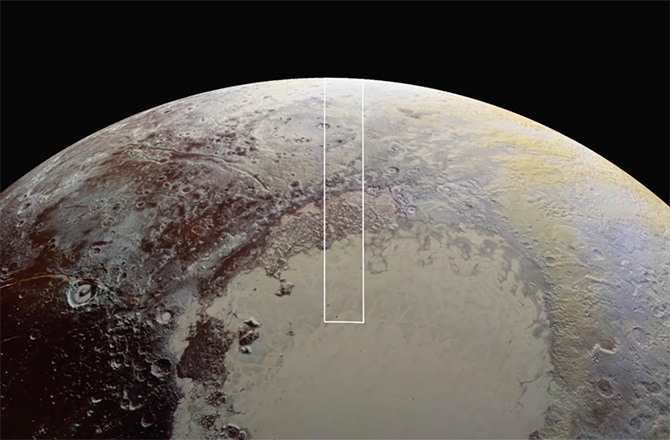Methane snow discovered on Pluto's peaks: NASA

NASA's New Horizons
team has discovered a chain of exotic methane snowcapped mountains stretching
across a dark expanse on Pluto.
One of Pluto's most identifiable features, Cthulhu Regio stretches nearly halfway around Pluto's equator, starting from the west of the great nitrogen ice plains known as Sputnik Planum.
Measuring about 3,000 kilometres long and 750 kilometres wide, Cthulhu is a bit larger than the state of Alaska, NASA said.
Cthulhu's appearance is characterised by a dark surface, which scientists think is due to being covered by a layer of dark tholins - complex molecules that form when methane is exposed to sunlight.
Cthulhu's geology exhibits a wide variety of landscapes - from mountainous to smooth, and to heavily cratered and fractured, NASA said.
Images captured by New Horizons spacecraft show a mountain range located in southeast Cthulhu that is 420 kilometres long.
justify;">The range is situated
among craters, with narrow valleys separating its peaks. The upper slopes of
the highest peaks are coated with a bright material that contrasts sharply with
the dark red colour of the surrounding plains.
Scientists think this bright material could be predominantly methane that has condensed as ice onto the peaks from Pluto's atmosphere.
"That this material coats only the upper slopes of the peaks suggests methane ice may act like water in Earth's atmosphere, condensing as frost at high altitude," said John Stansberry, a New Horizons science team member from Space Telescope Science Institute, Baltimore, Maryland.
Compositional data from the Ralph/Multispectral Visible Imaging Camera (MVIC) on New Horizons indicates that the location of the bright ice on the mountain peaks correlates almost exactly with the distribution of methane ice.
The images were obtained by New Horizons at a range of approximately 33,900 kilometres from Pluto, about 45 minutes before the spacecraft's closest approach to Pluto on July 14, last year.
AIMIM News
Latest Urdu News
Most Viewed
Do you think Canada-India relations will improve under New PM Mark Carney?






















.jpg)
.jpg)
.jpg)

















